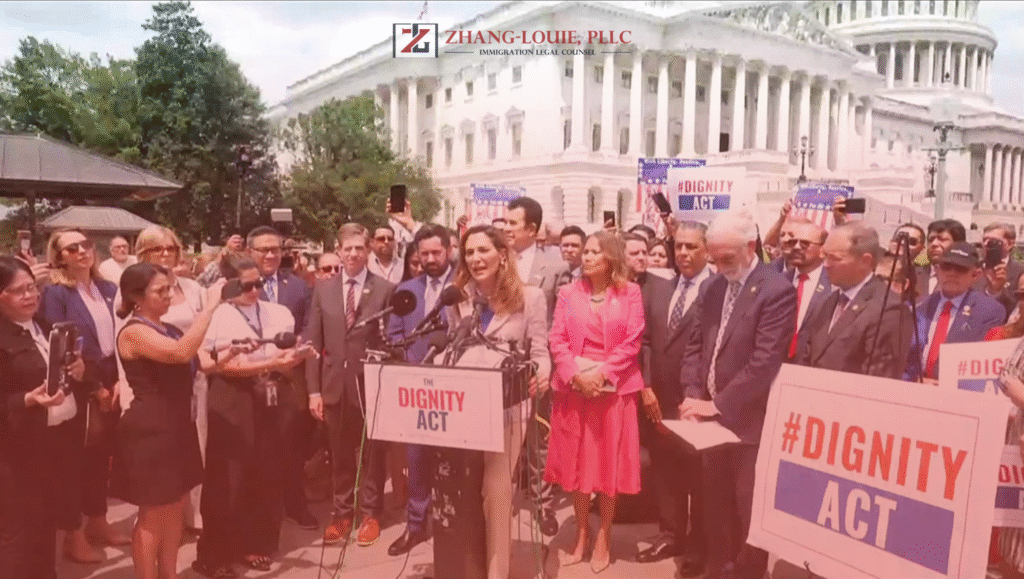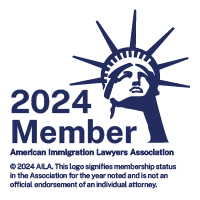
On July 15, 2025, a bipartisan group of U.S. lawmakers introduced a new version of the Dignity Act—a sweeping immigration reform proposal that touches everything from undocumented workers and Dreamers to asylum seekers and employment-based visa processing.
While the American Immigration Lawyers Association (AILA) has not officially endorsed the bill, it acknowledges the importance of cross-party cooperation to advance meaningful solutions. At Zhang-Louie PLLC, we help clients navigate these ever-evolving changes, and we’re watching this proposal closely. Here’s a breakdown of what this bill could mean for immigrants, employers, and families across the U.S.
Legal Status Without Citizenship: The Dignity Program
The cornerstone of the bill is the Dignity Program, which offers a form of temporary legal status—but not permanent residency or a path to citizenship—for undocumented immigrants who have been physically present in the U.S. since January 1, 2021.
Eligible participants must:
- Pass background checks
- Pay a $7,000 “restitution” fee (TPS recipients are exempt)
- Agree to a 1% income tax surcharge
- Maintain private health insurance
Participants can work and travel legally but are barred from federal benefits. Status is valid for 7 years and may be renewed, but there’s no automatic path to a green card or citizenship under this program.
A New Path for Dreamers
In contrast, Dreamers—those who arrived as minors and meet eligibility requirements—would receive conditional permanent residency for 10 years and eventually become eligible for lawful permanent resident (LPR) status and citizenship.
Border Security and Enforcement
The bill also proposes major changes to border enforcement, including:
- Expanded surveillance, infrastructure, and physical barriers
- Faster processing at ports of entry
- New criminal penalties for immigration-related offenses like unlawful reentry and asylum fraud
- Mandated nationwide use of E-Verify
- Stricter penalties for employers and employees who use false documents
The goal, according to sponsors, is to modernize immigration enforcement while addressing long-standing security gaps.
Faster Asylum Processing—With Controversial Changes
A fast-tracked asylum process would aim to complete cases within 60 days, including a 15-day credible fear interview and a 72-hour rest period. Most cases would be processed in newly created “humanitarian campuses”, where individuals would have access to legal and social services—though not government-provided legal counsel.
Notably, asylum seekers would be detained during this process, which marks a significant change from the current “catch and release” approach.
Immigration System Modernization
The bill also includes long-requested improvements, such as:
- Doubling the per-country visa cap (from 7% to 15%) to help reduce backlogs
- High-cost premium processing for green card applicants who’ve waited over 10 years
- “Dual intent” for F-1 visa holders (students), removing barriers to pursuing permanent residency
- Counting only principal applicants—not spouses and children—toward employment visa quotas
- Ph.D. holders in STEM fields now automatically qualify for O-1 visas
- A new visitor visa category for family-related visits like weddings and funerals
While the Dignity Act of 2025 is still a proposal and will face congressional debate, it reflects the urgency of fixing a strained immigration system. It balances enforcement priorities with legalization options for some immigrants and introduces significant changes to employment and asylum processes.
At Zhang-Louie PLLC, we help individuals and businesses stay ahead of U.S. immigration developments. Whether you’re a Dreamer, a student, or an employer trying to stay compliant, we’re here to guide you.
Questions about how the Dignity Act could impact you or your workforce? Reach out for a consultation.
GET IN TOUCH

